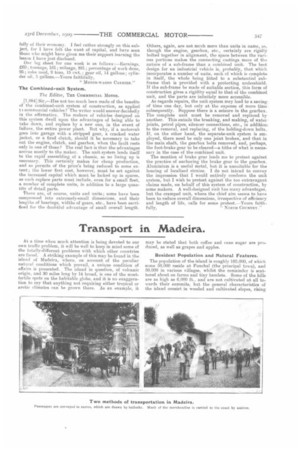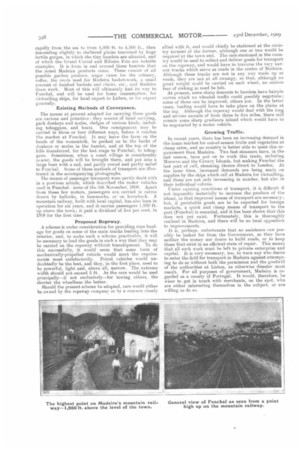Transport in Madeira.
Page 15

Page 16

If you've noticed an error in this article please click here to report it so we can fix it.
At a time when much attention is being devoted to our own traffic problem, it will he well to keep in mind some of the totally-different problems with which other countries are faced. A striking example of this may be found in the island of Madeira, where, on account of the peculiar natural conditions which prevail, a unique condition of affairs is presented. The island in question, of volcanic origin, and 30 miles long by 14 broad, is one of the mostfertile spots on the habitable globe, and it is no exaggeration to say that anything not requiring either tropical or arctic climates can be grown there. As an example, it may be stated that both coffee and cane sugar are produced, as well as grapes and apples.
Resident Population and Natural Features.
The population of the island is roughly 160,000, of which some 50,000 reside at Funchal (the principal town), and 50,000 in various villages, whilst the remainder is scattered about on farms and tiny hamlets. Some of the hills are as high as 6,000 ft„ and are not cultivated at all towards their summits, but the general characteristics of the island consist in wooded and cultivated slopes, rising
rapidly from the sea to from 4,000 ft. to 4,500 ft., then descending slightly to sheltered plains traversed by huge fertile gorges, in which the tiny hamlets are situated, and of which the Grand Curral and Ribeiro Frio are notable examples. It is from in and around these hamlets that the noted Madeira products come. These consist of all possible garden produce, sugar canes for the refinery, coffee, the reeds used for Madeira, basket-work, a small amount of finished baskets and (hairs, etc.. and Madeira linen work. Most of this will ultimately Lind its way to Funchal, and will be used for home consumption, for victualling ships, for local export to Lisbon, or for export generally.
Existing Methods of Conveyance,
The means at present adopted for carrying these goods are various and primitive; they consist of hand carrying, pack donkeys and mules, sledges of various kinds, including toboggans, and boats. One consignment may be carried in three or four different ways, before it reaches the market at Funchal. It may leave the farm on the heads of the womenfolk, be packed on to the backs of donkeys or mules in the hamlet, and at the top of the hills transferred, for the last stage to Funchal, to toboggans. Sometimes, when a coast village is considerably ntarer, the goods will be brought there, and put into a large boat with a sail, and partly rowed and partly sailed to Funchal. Some of these methods of transport are illustrated in the accompanying photographs.
The means of passenger transport were partly dealt with in a previous article, which described the motor vehicles used in Funchal -issue of the 5th November, 1008. Apart from these few motors, passengers are carried in carros drawn by bullocks, in hammocks, or on horseback. A mountain railway, built with local capital, has also been in operation for six years, and it carries passengers 1,0.30 ft. up above the town; it paid a dividend of five per cent. in 1908 for the first time.
Proposed Ropeway.
A scheme is under consideration for providing rope haulage for goods on some of the main tracks leading into the interior, and, to make such a scheme practicable, it will be necessary to load the goods in such a way that they may be carried on the ropeway without transhipment. To do this successfully, it would seem that sonic form of mechanically-propelled vehicle would meet the require-. meats most satisfactorily. Petrol vehicles would undoubtedly be the best, and they, in the first place, need to be powerful, light and, above all, narrow. The extreme width should not exceed 5 ft. As the cars would be used principally—if not exclusively—for towing others, the shorter the wheelbase the better.
Should the present scheme be adopted, ears would either be owned by the ropeway company or by a concern closely
allied with it, and would chiefly be stationed at the country termini of the former, although one or two would be required at the town end. The cars stationed in the country would be used to collect and deliver goods for transport on the ropeway, and would have to traverse the very narrow tracks which serve as roads in the centre of Madeira. Although these tracks are not in any way made up as roads, they are not at all swampy, so that, although no great weight could be carried on each wheel, no serious fear of sinking in need be felt. At present, some sharp descents to hamlets have hairpin curves which no wheeled traffic could possibly negotiate ; some of these can be improved, others not. In the latter eases, loading would have to take place on the plains at the top. Although the ropeway would deal with the long and serious ascents of from three to five miles, there still remain some sharp gradients inland which would have to be negotiated by a motor vehicle.
Growing Traffic.
In recent years, there has been an increasing demand in the home market for out-of-season fruits and vegetables at cheap rates, and no country is better able to 'meet this requirement than Madeira. Two fast steamers have, in the last season, been put on to work this trade, including Morocco and the Canary Islands, but making Funchal the last port of call, steaming thence direct to London. At the same time, increased demands are being made on supplies by the ships winch call at Madeira for victualling, and these are not only increasing in number, but also in their individual volume.
Under existing conoitions of transport, it is difficult if not impossible materially to increase the produce of the island, to that improved means of transport are necessary ; but, if perishable goods are to be exported for foreign markets, a quick and cheap means of transport to the port (Funchal) is essential, and it has been shown that this does not yet exist. Fortunately' this is thoroughly realized in Madeira, and there will be no local opposition to improvements.
It is perhaps, unfortunate that no assistance can possibly 1.;13 looked for from the Government, as they have neither the money nor desire to build roads, or to keep those that exist in an efficient state of repair. This means that all such work must be left to private enterprise and capital. It is very necessary, too, to warn any who desire to enter the field for transport in Madeira against attempting to do so without both the permission and the goodwill of the authorities at Lisbon, as otherwise disaster must result. For all purposes of government, Madeira is regarded as a county of Portugal. It would, therefore, be wiser to get in touch with merchants, on the spot, who are either interesting themselves in the subject, or are willing to do so.




















